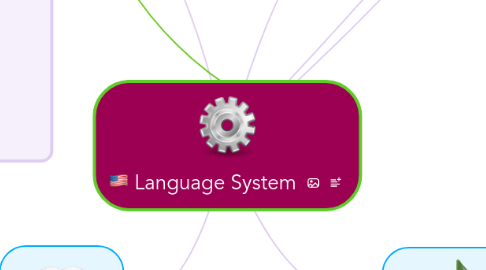
1. Syntactic
1.1. * The syntactic system of language relates to the structure of language. This involves word order, sentence structure, and grammar usage. This system controls the way in which words are used in sentences. The syntactic system is unique to the language upon which it is based. For example, in Standard English, adjectives precede vowels.http://www.elearnportal.com/courses/education/methods-of-teaching-language-arts-in-public-schools/methods-of-teaching-language-arts-in-public-schools-four-language-systems
1.1.1. Parts of speech
1.1.1.1. Parts of speech (or word classes) are commonly divided into open classes (nouns, verbs, adjectives, and adverbs) and closed classes (pronouns, prepositions, conjunctions, and interjections). http://grammar.about.com/od/pq/g/partsspeechterm.htm
1.1.2. Apropiancy
1.1.3. Cohesion
1.1.3.1. The use of repetition, transitional expressions, and other devices (cohesive cues) to guide readers and show how the parts of a composition relate to one other.These are some examples of: Sentence combining= Instead, Therefore, In fact, On the contrary and However.
1.1.4. Themes
1.1.5. New Topic
2. Pragmatics
2.1. *The analysis of language in terms of the situational context within which utteraces are made, including the knowledge and beliefs of the speaker and the relation between speaker and listener.
2.1.1. Context
2.1.1.1. “Have you got any cash on you?” where the speaker really wants the hearer to understand the meaning: “Can you lend me some money? I don't have much on me.” http://www.teachit.co.uk/armoore/lang/pragmatics.htm
2.1.2. Background of foreign language
2.1.3. Discourse
2.1.4. Register
2.1.5. Moods
2.1.6. Forengegrounding
2.1.7. Politeness
2.1.7.1. Pessimism: I don't suppose you could close the window, could you? Indicating deference: Excuse me, sir, would you mind if I asked you to close the window? Apologizing: I'm terribly sorry to put you out, but could you close the window? Impersonalizing: The management requires all windows to be closed. http://www.teachit.co.uk/armoore/lang/pragmatics.htm
2.1.8. Relevance
2.1.9. Deixis
2.1.9.1. Personal or possessive pronouns (I/you/mine/yours), Demonstrative pronouns (this/that), (Spatial/temporal) adverbs (here/there/now), Other pro-forms (so/do), Personal or possessive adjectives (my/your), Demonstrative adjectives (this/that), Articles (the). http://www.teachit.co.uk/armoore/lang/pragmatics.htm
3. The domain of the Language System defines patterns of the structure that will aid students in the language attainment process; the content that is at the core of being acquiring a new language is important thus the confidence of the student and the major objective at the end of all courses that will be a smooth adaptation of the target language; for that reason teachers should concentrate on all different aspects of the language system. The domain of the Language System defines patterns of the structure that will aid students in the language attainment process; the content that is at the core of being acquiring a new language is important thus the confidence of the student and the major objective at the end of all courses that will be a smooth adaptation of the target language; for that reason teachers should concentrate on all different aspects of the language system.
4. I help People communicate. What is your super power?
5. Semantics
5.1. *Meaning of language. The semantic system is an important aspect of language because it allows an individual to understand or express nuances of meaning by using specific words - See more at: http://www.elearnportal.com/courses/education/methods-of-teaching-language-arts-in-public-schools/methods-of-teaching-language-arts-in-public-schools-four-language-systems#sthash.nLjcOAuH.dpuf
5.1.1. Vocabulary
5.1.2. Collocations
5.1.2.1. words become grouped in almost predictable ways these are fixed expressions. Examples include jewel in the crown, desirable residence, criminal mastermind, world of work, address the issues, I put it to you. http://www.teachit.co.uk/armoore/lang/semantics.htm#7
5.1.3. Affixation
5.1.4. Compound Words
5.1.5. Connotation
5.1.5.1. Connotation is connected with psychology and culture, as it means the personal or emotional associations aroused by words. When these associations are widespread and become established by common usage, a new denotation is recorded in dictionaries. A possible example of such change would be vicious. Originally derived from vice, it meant “extremely wicked”. In modern British usage it is commonly used to mean “fierce”, as in the brown rat is a vicious animal. http://www.teachit.co.uk/armoore/lang/semantics.htm#7
5.1.6. Lexis
5.1.6.1. As a lexical unit may contain more than one word, David Crystal has coined the term lexeme. This is usually a single word, but may be a phrase in which the meaning belongs to the whole rather than its parts, as in verb phrases tune in, turn on, drop out or noun phrase (a) cock up. http://www.teachit.co.uk/armoore/lang/semantics.htm#7
5.1.7. Conceptions of meaning
5.1.8. Ambiguity
5.1.9. Metaphor, simile and symbol
5.1.10. Implication
5.1.10.1. This is meaning which a speaker or writer intends but does not communicate directly. http://www.teachit.co.uk/armoore/lang/semantics.htm#7
6. Phonological
6.1. *The phonological system is often called the sound system of language. This system is responsible for recognizing the distinct speech sounds heard in language. http://www.elearnportal.com/courses/education/methods-of-teaching-language-arts-in-public-schools/methods-of-teaching-language-arts-in-public-schools-four-language-systems
6.1.1. Phonome
6.1.2. Segmental
6.1.3. Phonetics
6.1.3.1. Phonetics deals with the production of speech sounds by humans, often without prior knowledge of the language being spoken. http://www.phon.ox.ac.uk/jcoleman/PHONOLOGY1.htm
6.1.4. Rhythm
6.1.5. Stress
6.1.5.1. In phonetics, the degree of emphasis given a sound or syllable in speech. One of the main functions of stress is to provide a way of distinguishing degrees of emphasis or contrast in sentences or lines of verse. http://grammar.about.com/od/rs/g/Stress.htm
6.1.6. Voiceless Stop
6.1.7. Rhime
6.1.8. Phonetic Symbols
6.1.9. Intonation
6.1.9.1. In linguistics, the use of changing vocal pitch to convey grammatical information or personal attitude. http://grammar.about.com/od/il/g/intonationterm.htm
